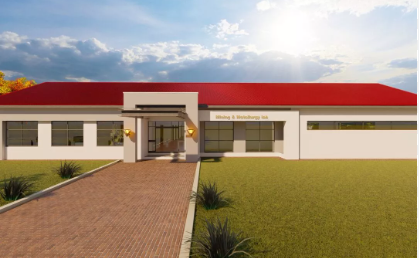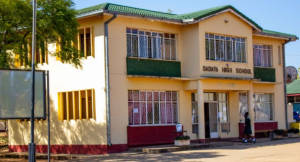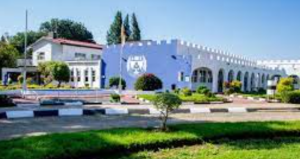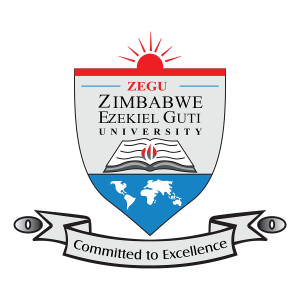The Essentials
Type of Institution: University
Fees per Semester: US$400.00 to US$800.00
Address: P Bag 30, Filabusi, Zimbabwe
Phone Number: +263 842 824 720/1
Chancellor: E.D Mnangagwa
Vice Chancellor: Professor Doreen Z. Moyo
Number of students:1000+
Website: https://www.gsu.ac.zw/
Email: info@gsu.ac.zw
Table Of Contents
- Overview
- Contact Details
- Address
- Location
- School Fees
- Courses & Programs
- Vacancies and Entry Requirements
- Logo
- Notable Alumni
- Pros and Cons
- Author’s Review
Overview
Gwanda State University (GSU) is a relatively young and emerging public university in Zimbabwe, located in the Matabeleland South province.
Established to meet the growing demand for higher education in the region, GSU plays a critical role in providing access to quality tertiary education, particularly in the fields of mining, engineering, agriculture, and environmental sciences, which align with the economic activities of the region.
Academic Focus
GSU emphasizes programs that support the local economy and development needs, with a strong focus on practical and applied sciences. The university offers undergraduate and postgraduate degrees across various faculties, including:
*Faculty of Engineering and the Built Environment: This faculty focuses on producing graduates skilled in mining engineering, metallurgy, and other related disciplines, reflecting the mining-rich nature of Matabeleland South.
*Faculty of Agricultural Sciences: GSU offers programs designed to enhance agricultural productivity and sustainability, preparing students to contribute to the region’s agricultural sector.
*Faculty of Natural Resources Management and Agriculture: This faculty integrates environmental studies with agricultural practices, addressing the critical need for sustainable resource management.
Infrastructure and Facilities
Although still in development, GSU is expanding its infrastructure to support a growing student population. The university is investing in modern facilities, including state-of-the-art laboratories, lecture halls, and libraries, to create an environment conducive to learning and research.
Community Engagement
GSU is committed to community engagement and development. The university actively participates in projects that benefit the local communities, particularly in the areas of agriculture and natural resource management, ensuring that its educational initiatives have a direct impact on the surrounding region.
Research and Innovation
As a young institution, Gwanda State University is building its research capacity, with a focus on areas that are relevant to the region, such as mining, agriculture, and environmental sustainability.
The university encourages students and faculty to engage in research that addresses local challenges while contributing to national and global knowledge.
Student Life
GSU offers a growing range of extracurricular activities and student services, including sports, clubs, and societies. These activities are designed to provide a well-rounded university experience, promoting personal development alongside academic achievement.
Vision and Growth
Gwanda State University aims to become a leading institution in applied sciences and technology in Zimbabwe and beyond.
As the university continues to grow, it remains focused on expanding its academic offerings, enhancing research capabilities, and building partnerships that support its mission of contributing to the socio-economic development of the region.
Gwanda State University (GSU) Contact Details
You can contact Gwanda State University (GSU) via their landline, email or you can visit their website for further contact details.
Phone Number: +263 842 824 720/1
Website: https://www.gsu.ac.zw/
Email: info@gsu.ac.zw
Gwanda State University (GSU) Address
P Bag 30, Filabusi, Zimbabwe
Gwanda State University (GSU) Location
Gwanda State University (GSU) is situated in a small town called Filabusi in the Matebeleland South region approximately 106 km away from the city of Bulawayo.
Gwanda State University (GSU) Fees
Gwanda State University (GSU) fees is currently standing at US$400.00 to US$1 000.00 per semester depending on the program you are studying and the level of degree you are studying. Please contact the institution or visit them to get the latest fees structure as it can change at any term or semester.
Gwanda State University (GSU) Courses & Programs
Gwanda State University (GSU) in Zimbabwe offers a variety of undergraduate and postgraduate programs across different faculties.
Undergraduate Programs
Faculty of Engineering and the Environment
Bachelor of Engineering (Honours) Degree in Mining Engineering
Bachelor of Engineering (Honours) Degree in Metallurgical Engineering
Bachelor of Engineering (Honours) Degree in Geomatics and Surveying
Bachelor of Engineering (Honours) Degree in Geological Engineering
Bachelor of Engineering (Honours) Degree in Environmental Engineering
Faculty of Agriculture and Natural Sciences
Bachelor of Science (Honours) Degree in Animal Science
Bachelor of Science (Honours) Degree in Crop Science
Bachelor of Science (Honours) Degree in Horticulture
Bachelor of Science (Honours) Degree in Agriculture Economics and Development
Bachelor of Science (Honours) Degree in Agribusiness Management
Bachelor of Science (Honours) Degree in Food Science and Technology
Faculty of Business Sciences
Bachelor of Commerce (Honours) Degree in Accounting
Bachelor of Commerce (Honours) Degree in Banking and Finance
Bachelor of Commerce (Honours) Degree in Marketing
Bachelor of Commerce (Honours) Degree in Human Resource Management
Bachelor of Commerce (Honours) Degree in Risk Management and Insurance
Bachelor of Commerce (Honours) Degree in Logistics and Supply Chain Management
Bachelor of Commerce (Honours) Degree in Entrepreneurship and Innovation
Postgraduate Programs
Master of Science in Agriculture
Master of Science in Engineering
Master of Business Administration (MBA)
Gwanda State University (GSU) Vacancies and Entry Requirements
Gwanda State University (GSU) typically offers vacancies and has specific entry requirements for prospective students across its various faculties and programs.
Vacancies
Undergraduate Programs
GSU usually announces vacancies for undergraduate programs before the start of each academic year or semester. These vacancies are available across the faculties of Engineering and the Environment, Agriculture and Natural Sciences, and Business Sciences.
The number of vacancies may vary depending on the program and the capacity of the university.
Postgraduate Programs
Vacancies for postgraduate programs such as Master’s degrees in Agriculture, Engineering, Environmental Management, and Business Administration are also announced periodically. These programs typically have more limited spaces compared to undergraduate programs.
Special Entry and Mature Entry
GSU may offer vacancies under special entry and mature entry schemes for students who do not meet the standard entry requirements but have relevant experience or qualifications.
Entry Requirements
Undergraduate Programs
General Entry Requirements:
*A minimum of 5 O-Level passes including English Language and Mathematics, with at least a grade C or better.
*A-Level passes in subjects relevant to the chosen degree program. For example, for Engineering programs, A-Level passes in Mathematics and Physics are typically required.
*Applicants with relevant diplomas or certificates may also be considered for admission.
Specific Program Requirements:
Engineering Programs: A-Level passes in Mathematics and Physics are essential, with a strong emphasis on a good grade in these subjects.
Agriculture and Natural Sciences: A-Level passes in Science subjects such as Biology, Chemistry, and Agriculture are required.
Business Sciences: A-Level passes in commercial subjects such as Economics, Business Studies, and Accounting are required.
Postgraduate Programs
Master’s Degree Requirements:
*A relevant undergraduate degree from a recognized institution, usually with at least a second-class (lower division) pass.
*Some programs may require relevant work experience or professional qualifications.
*Specific programs, such as the Master of Business Administration (MBA), may have additional requirements like a minimum of two years of work experience in a managerial or professional role.
*English Language Proficiency: Non-native English speakers may need to provide proof of English language proficiency, typically through exams like IELTS or TOEFL, unless they have studied in an English-speaking country.
Application Process
Online Application: Prospective students can apply online through the GSU website during the application periods.
Supporting Documents: Applicants are required to submit supporting documents, including certified copies of academic certificates, identification documents, and proof of payment of the application fee.
Selection Process: The university’s admissions committee reviews applications based on academic merit, and shortlisted candidates may be invited for interviews or additional assessments depending on the program.
Note
Entry requirements and application details are subject to change, so it is advisable for prospective students to check the latest updates directly from GSU’s official communications or website.
If you’re interested in specific programs or need more detailed information about the application process, it might be helpful to visit GSU’s official website or contact their admissions office directly.
Gwanda State University Logo
Below is the logo of Gwanda State University with excellent quality and it is available to download in PNG (transparent file) JPEG and PDF.
Gwanda State University Pros and Cons
Pros
Focused Specializations: GSU offers specialized programs in fields like Mining Engineering, Metallurgical Engineering, and Agriculture, which are highly relevant to the economic activities in the Matabeleland South region and Zimbabwe as a whole.
Strategic Location: The university is located in Gwanda, a town with significant mining and agricultural activities, providing students with practical exposure and opportunities for internships and job placements in relevant industries.
Growing Institution: As a relatively new and developing institution, GSU is continually expanding its programs and facilities, offering students the opportunity to be part of a growing academic community.
Industry Partnerships: GSU is likely to have partnerships with industries in mining, agriculture, and related fields, giving students access to hands-on learning experiences and potential employment opportunities after graduation.
Community Impact: The university plays a key role in contributing to the socio-economic development of the Matabeleland South region, making it a significant institution for local and regional progress.
Smaller Class Sizes: With GSU being a newer and smaller institution, students may benefit from smaller class sizes, allowing for more personalized attention from lecturers and a closer-knit student community.
Cons
Limited Course Offerings: Compared to more established universities, GSU has a more limited range of programs and faculties. This might restrict options for students who are interested in courses outside the university’s core specializations.
Developing Infrastructure: As a growing university, some facilities and resources (such as libraries, laboratories, and recreational amenities) may still be under development, which could impact the overall student experience.
Location Challenges: Gwanda’s relatively remote location might be less appealing to students who prefer to study in larger urban centers like Harare or Bulawayo, where there are more amenities, social activities, and networking opportunities.
Limited Recognition: As a newer institution, GSU may not yet have the same level of recognition or prestige as older, more established universities in Zimbabwe, which could influence perceptions among employers and the general public.
Resource Availability: The university might face challenges in acquiring adequate academic resources, such as a wide range of academic journals, books, and up-to-date technology, especially in its formative years.
Potential Growing Pains: As a relatively new university, GSU might experience administrative and logistical challenges typical of institutions that are still expanding and refining their operations.
Author's Review
Gwanda State University stands out as a promising institution dedicated to specialized education in fields critical to Zimbabwe’s economic development, such as mining, engineering, and agriculture. Its strategic location in Gwanda offers students unique opportunities for practical experience and industry connections.
While the university’s growing infrastructure and limited course offerings reflect its status as a developing institution, these factors also present opportunities for students to contribute to its growth and evolution.
Prospective students should weigh the benefits of GSU’s focused programs and personalized learning environment against the challenges of its developing resources and more remote location.
Overall, Gwanda State University represents a valuable choice for those seeking a specialized education in a dynamic and emerging academic community.




